Seven months after the Ebola outbreak turned Liberia upside down, President Ellen Johnson Sirleaf came to Washington on Thursday to say thanks to a country she said did so much.
"You did not run from Liberia. ... With many of our global challenges, America stood up and America stood with us," she told a Capitol Hill audience.
Late last year, the Ebola-stricken nations of Liberia, Sierra Leone and Guinea saw about 800 new cases a week.
Of those afflicted by the deadly virus, Liberia, where about 4,000 people have died, is seen as the most advanced in curbing the disease's spread. Earlier this month, children lined up again to go back to school, and borders between the neighboring countries reopened. But Sirleaf said as her country celebrates success, the fight is not over.
“We are transitioning from treatment to prevention with the support of over 100 partners from 26 countries," she said. "Liberia has only 218 medical doctors and 5,234 nurses to serve a population of 4.3 million, and we know that these facts will not change overnight.”
U.S. Senator Chris Coons, a Delaware Democrat who invited Sirleaf to speak at the U.S. Senate offices, visited Liberia during the height of the outbreak.
“One of the hardest things for leaders to do is to ask for help," he said. "They tend to think doing so is a sign of weakness. But the truth is what it really signals is dedication and strength.”
As Liberia and neighboring countries see progress, President Barack Obama recently said most of the 3,000 troops deployed to West Africa to help contain Ebola will be back in the U.S. by the end of April. But he’s not declaring it "mission accomplished" until the virus is extinguished.
“Our focus now is getting to zero," Obama said. "Because as long as there's even one case of Ebola that's active out there, risks still exist. Every case is an ember that if not contained can light a new fire."
This week, the United Nations called for more funding support for the next phase of bringing the number of cases down to zero.
Bruce Aylward, World Health Organization assistant director-general for polio and emergencies, said, “One of the biggest risks we face right now is that new financing for this response is falling faster than the new cases. That’s the reality.”
And as long as the virus is there, he said, it can spread and escalate.





